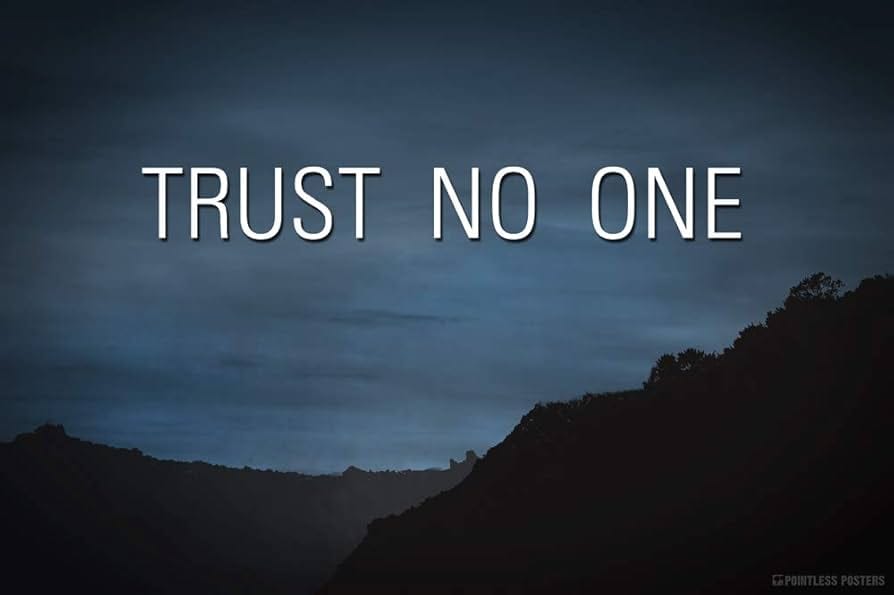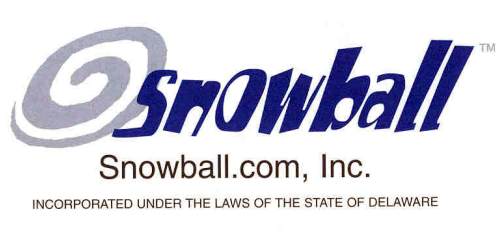Trust No One

Every few weeks, a particular article will make the rounds in my various circles and chats. I'll see it pop up in more places than usual, not just on Bluesky but in a WhatsApp group, or not just in a WhatsApp group but also texted to me and referenced in conversation. This week it was the article in the New York Times about the death of the dream job in tech.
As some of you will remember, this whole enterprise of Meets Most as a newsletter started when I got laid off in 2023. For those keeping count, I have been through four layoffs in my career. To be clear, one was in 1997 and the other in 2001, meaning I started and closed out my Dot Com years in the manner you might expect from someone who takes a somewhat record-scratch-freeze-frame-yep-that's-me approach to writing about her illustrious tech career(s). But still, my total number of layoffs is four, at both tiny startups and big companies, and I have experienced both the fat and lean years in multiple industry eras. So I hope you will give me a little leeway and forgiveness when I say: How are this many of you surprised by the industry's about-face?
There's a part of me that's trying to hold myself back in writing this, because I know I'm going to come across as an asshole, one who is very full of herself and who thinks the rest of you are rubes. But it is the year 2025 and I am very tired. Then again, I am also the person who, during an interview when asked "Tell me about your dream job," once responded, "Pampered third wife, but I don't think that's the job currently on the table." So take all of this with a grain of salt.
Most of you probably won't remember this, but in the late '90s there was a website – or rather, a network of websites – called Snowball.com. The network was formed of websites that were owned by Imagine Media (founded by Future Publisher founder and eventual TED Talk founder Chris Anderson, although not the same Chris Anderson as the one-time WIRED Editor-in-Chief), and were spun off from the print side of the company into their own digital company. Snowball.com's two biggest sites were IGN.com (still around obviously) and ChickClick.com (RIP).

If you are very nice to me, I will show you the television commercial about Snowball.com that features a 24-year-old me. Yes, there was a television commercial about a bunch of websites, because it was the '90s.
I worked at Imagine Media and then at Snowball.com for about 3 to 3 1/2 years. The entire time I worked there, I was a part of the IGN team, although I did not become a writer and editor until late 1998/early 1999. Part of the reason I even wanted to become a web editor was that the web editors were all a lot of fun compared to the business people, tech people, and even the print editors. They were fun in the same way that the kids in the back of the bus were fun: Rowdy sarcastic assholes who would never make anywhere near as much money as the kids toward the front. So when the Snowball.com spinoff was announced, you can imagine how much we hated the name, which was not only stupid but ripe for mockery. And when the details of the spinoff and the planned IPO were announced at a big company meeting, it was no surprise that the web editors were literally in the very back of the room, rolling our eyes at the nascent tech industry Kool-Aid coming from the stage.
Toward the end of the big meeting, Chris Anderson took the stage and to tell all of us about the adventure we were embarking on together. He stood there and said to us, in his lovely English accent, "We're all part of a flying machine, and we're standing on the precipice of an abyss." If the parts of the flying machine did not work together, he told us, the flying machine would, of course, find itself at the bottom of the abyss. You can imagine the response from the web editors at my table. We laughed and rolled our eyes so hard I'm surprised nothing registered on the seismographs monitoring San Francisco. As much as I thought Chris was a nice guy and certainly smart and successful, even then I knew this was absolute bullshit.
And true to form, it was. About a year later, Snowball.com went public. The IPO was a modest debut, modest enough to make you again wonder why on earth anyone would choose the name Snowball for a youth-oriented website network. "Snowball.com's IPO melts in spring," anyone? Melt it did, eventually, thanks in large part to the people who had been put in charge. Just over a year after the IPO, we'd run through an extraordinary amount of money, our flying machine was being dismantled by the board and was at risk of being delisted by Nasdaq, and we were working as a skeleton crew after two rounds of layoffs. By the time it was my turn, alongside some fellow editors who also had helped to build the flying machine from the ground up and whom the company had tried to hold onto for as long as possible, there was so little money left that we got the smallest severance packages, despite having worked there the longest. I'll never forget how my poor friend and coworker, who was tasked with laying me off, had to look me in the face and tell me I got two weeks' severance and would have health insurance through the end of the month... which ended in one week.
After IGN, I disappeared into graduate school for a very long time, first getting a Masters degree, then another Masters and PhD. But I never forgot how the snarky assholes in the back of the room had been right to be cynical. I never forgot watching a CEO (not Chris Anderson, they'd hired someone else) and his leadership team systematically destroy all the real honest-to-god hard work that had gone into making IGN and ChickClick two of the biggest, most successful websites of the late '90s. I saw them spend money on the stupidest stuff (their salaries and unnecessarily flashy offices, but also, again: television commercials for websites) while claiming it was for all our good, and then not have enough money to give proper severance to the people whose blood, sweat, and literal tears had enabled the company to even spin off and hire a CEO in the first place. I watched people who were not at fault feel deep, unbearable guilt and responsibility for the rapid downfall of the company and failure of the websites – editors who somehow believed their choices about the content they ran were somehow to blame for the company's undoing – while the people actually at fault never said so much as sorry.
They couldn't, right? Legally, to protect themselves or the company, they probably couldn't. Or weren't capable of it. Because no matter what a for-profit corporation or a for-profit corporation's representative says, nothing it does is truly for the good of the employees. This is doubly true for a for-profit, publicly traded corporation. All the food, all the cool perks, all the benefits, all the supposed transparency and open debate, all the "we're part of a magical flying machine" rhetoric: All of it is still in service of the company. If a company feeds you, that means you spend less time going to get lunch or cooking for yourself, which means you can spend more time working. If a company offers you fun off-sites and work trips, you are still working. Can you take advantage of the benefits and perks? Obviously you can, and lots of people do. But that never meant they were ultimately for your benefit.
That's why I find it so jarring to still see people remark on things like "institutionally approved playfulness." Guys, it's Sociology 102: If the institution approves of it, that means it's already been co-opted in service of the institution.
I'll never forget when I worked at Spotify in Stockholm and the company was finishing renovations on one of the offices. The two offices were about a 15 to 20 minute walk from one another, and once the construction was finished, one would primarily house the business side of things while the other housed the product and technical side. Someone in operations posted a big update on Workplace (Facebook for work, if you're not familiar), which detailed which of the two offices would get the foosball table and which would get the LAN gaming room, what the snack options would be, and so on.
I have never in my life seen employee participation and activism on any work-related issue like I saw on that post. Endless threads from software engineers demanding to know why we'd no longer be offered a particular brand of protein bar, why they were allowing the LAN gaming room in one office to degrade and not be updated, and why the foosball table was in the office where the majority of the engineers were not. One engineer in particular was irate, saying he no longer knew how he would engage in stress relief if he was required to walk to the other office to play foosball.
Before you ask: The majority of the comments I saw were from Swedes, although there were plenty from non-Swedish employees as well. But this sort of thing happened at almost every company I worked for, and I never understood it. In part because it reeked of entitlement, but in part because I knew it was like the Pale Man's feast in Pan's Labyrinth. Partaking in the feast – worse, demanding more of it – is to partake in your own downfall.

Only one time did I allow myself to go all in and believe, and I did so intentionally. When I joined Slack in 2015, I thought, "If you're ever going to try to believe, this is the company and the time." Six months later I snapped myself out of it: No matter what anyone said and no matter how nice any of the swag was, Slack was still a company. As such, I needed to treat it like one.
Don't worry, I'm not going to embark on a big "capitalism is bad" detour now, if only because capitalism has only existed for 400 or maybe 600 years, but humans have found ways to be shitty to one another and take advantage of each other for thousands. To be fair, even when I've known companies don't give a shit about me, I've still gone overboard to try and prove my value, given way more than I should have in the hopes they'd approve of me. Just the same, I've never been much of a joiner or one for team spirit. I loathe enforced fun. I want to belong but I never feel like I do, like a perennial insider/outsider no matter where I'm standing. And while I know better and know that nothing lasts forever, even I got lulled into a false sense of security and was surprised when Meta began its big layoffs. I may never cared for most of the bells and whistles, but I did bank on being able to stay at that job for as long as I could handle it.
But man, lulled as I was, as many cool perks as I've enjoyed (and believe me when I say I really miss the pay and the benefits), tech has long been a "shut up and grind" for me. For many of us! I know it's even worse now, with unbearable workloads in workplaces ruled by fear. I've talked to friends who are still at places like Meta or Google. Even so, I don't know how to deal with people who are still surprised. I think of the young software engineer who asked Meta's leadership whether they'd still pay for employee clubs, like her boba club, which was important because walking to get corporate-sponsored boba drinks was important for team bonding. She asked about this the day after 11,000 people lost their jobs.
So if you're upset at how the industry has changed, or if you're surprised, consider that it's possibly because you're an engineer, the most vaunted and revered of industry employees who were mostly protected and honestly coddled. Or maybe you're a product manager or in senior leadership. So it's tough for you now? Welcome to the club, baby.
Until next Wednesday.
Lx
Leah Reich | Meets Most Newsletter
Join the newsletter to receive the latest updates in your inbox.
